World
Global issues, U.N., etc.
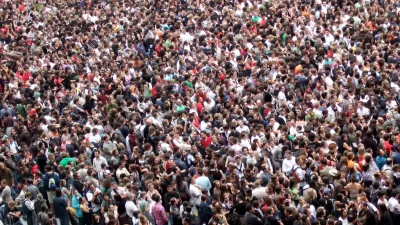
Whatever Happened to the Population Bomb?
Biology Professor Paul Ehrlich's 1968 book, "The Population Bomb," took America and the world by storm. The apocalyptic vision based of population outgrowing its resources appeared to make inherent sense.
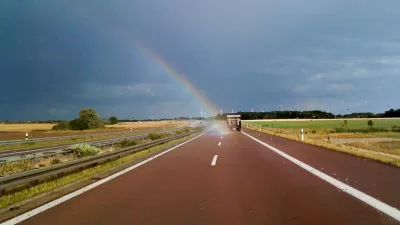
Narrower Lanes, Safer Streets
A new study indicates that the safest urban streets have lanes that measure 10-10.5 feet wide. Narrower and wider lanes have higher crash frequencies, and wider lanes have higher crash severity.
Geospatial Technologies for a Healthier, Sustainable, and Increasingly Urban Earth
Penn IUR Co-Directors Genie Birch and Susan Wachter write about the promise of geospatial technologies in promoting sustainable urbanization.
Imagining Neighborhoods Filled with 3D Printed Homes
Gensler, along with partners in China, is exploring ways to implement 3D printing technology. It's time for planners to start letting their imaginations run wild with possibilities.
Friday Eye Candy: 'Time-Lapse Mining' Reveals a Changing Planet
Someone's done the hard work of finding, sorting, and stitching together millions of photos from the Internet to create animated portraits of the evolution of places.
Questioning the Wisdom of Crowd Funding
After a splashy project recently hit its crowdfunding goals, one write dares to suggest that such fund raising methods might not be the best idea.
Smart Mobility Fosters New Transportation Options
A new Deloitte report evaluates ways that new technologies and mobility services help reduce the need to own and use private automobiles. Helsinki's audacious goal: By 2025, no city resident will need to own a private car.
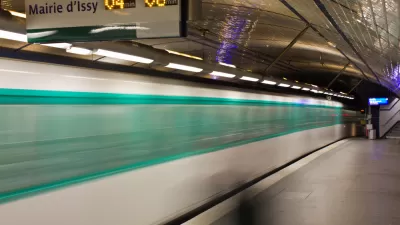
An Animation of the World's Transit Systems
"A German university student has developed a fun new tool for visualizing public transit in a more system-oriented way," according to a post by Sam Sturgis.
The Price of Global Energy Subsidies: $5.3 Trillion
An IMF working paper determined that global energy subsidies totaled $5.3 trillion this year, the worst offenders are China and the U.S. Placing a price on these subsidies, which include air pollution and carbon emissions, may be key to mitigation.
Study: Golden State Should Change Name to Greenest State
California's economy is not only the "least carbon-intensive" in the United States, it's the second lowest in the world when measured per economic output, according to a new study that evaluates economics and environment.
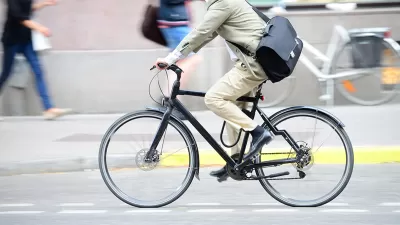
Study: Bike Commuters Are Less Stressed
A new study finds that biking to work does wonders for reducing stress levels throughout the day. Too bad most it's so hard to fund biking infrastructure.
'General Welfare' for the Next Generation
The "health, safety, and general welfare" of our communities are poorly served by the outcomes of the status quo.
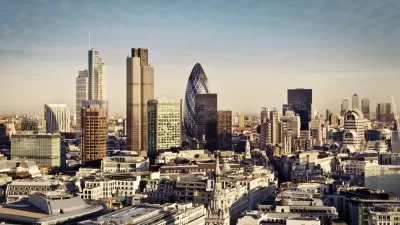
Metros Seek Balance Between Fragmentation and Amalgamation
As the world's cities grow ever larger, local governments constantly ask themselves which is better: amalgamating into one metro-wide government, or maintaining autonomy among fragmented jurisdictions? The answer remains unclear.
The Latest Research on the Adoption and Growth of Bikeshare Systems
Academics and professional planners have access to plenty of research and data to continue to improve and expand bikeshare systems around the world.
Carbon Dioxide Levels Reach Record Level in March
The last time carbon dioxide levels were this high was a million years ago. The global community needs to reduce emissions by 80 percent to stop the increase in CO2 levels. The data was reported by the National Oceanic and Atmospheric Administration.
Welcome to the 'Age of Animals as Infrastructure'
Animals are more than just guests or co-habitants in our cities, according to an article in New Scientist—they're a critical component of the infrastructure that keeps cities running.
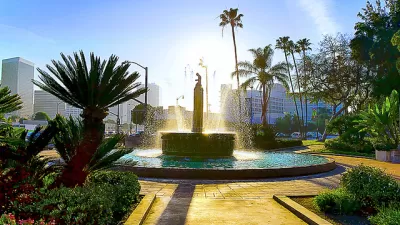
How Capitalists View Cities
The Milken Institute Global Conference brought hoards of business leaders to Beverly Hills last week. Sessions included some high praise for cities and buoyant predictions about innovation, development, and accommodating six billion city-dwellers.
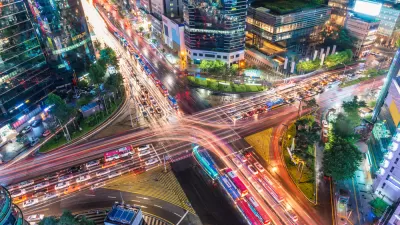
Cities Try to Turn on the Dark
Of all the inventions of the modern world, few have been so embraced as artificial light. But constant light, like that which floods city streets and illuminates buildings, is not necessarily healthy or safe. Some cities are trying to go dark.
Moving to Cities in Droves: Wildlife, of Course
There are animals among us. Boars in Berlin, coyotes in Washington, D.C., and mountain lions in Los Angeles are just a few examples of the wildest populations moving to cities.
Tolling, Road User Charge Examined at Annual Transportation Conference
Transportation finance and road usage charging are the themes of the International Bridge, Tunnel and Turnpike Association's annual conference held in Portland from April 26 to 28 in downtown Portland. Oregon's road usage charge begins July 1.
Pagination
Urban Design for Planners 1: Software Tools
This six-course series explores essential urban design concepts using open source software and equips planners with the tools they need to participate fully in the urban design process.
Planning for Universal Design
Learn the tools for implementing Universal Design in planning regulations.
Heyer Gruel & Associates PA
JM Goldson LLC
Custer County Colorado
City of Camden Redevelopment Agency
City of Astoria
Transportation Research & Education Center (TREC) at Portland State University
Jefferson Parish Government
Camden Redevelopment Agency
City of Claremont


































